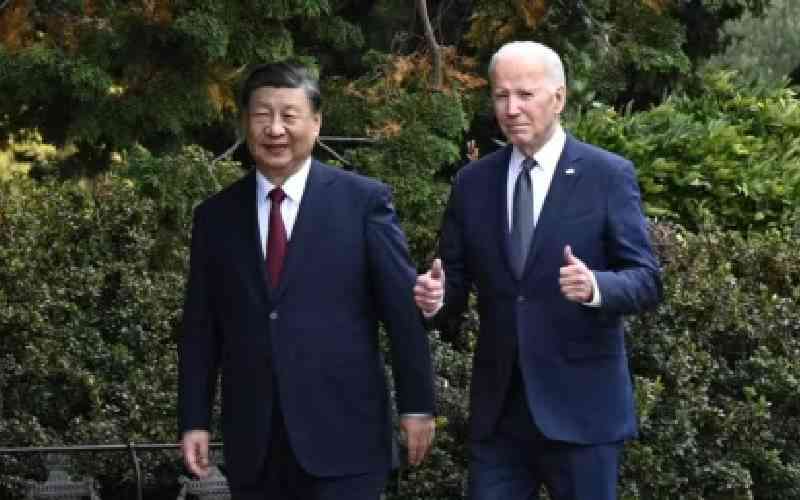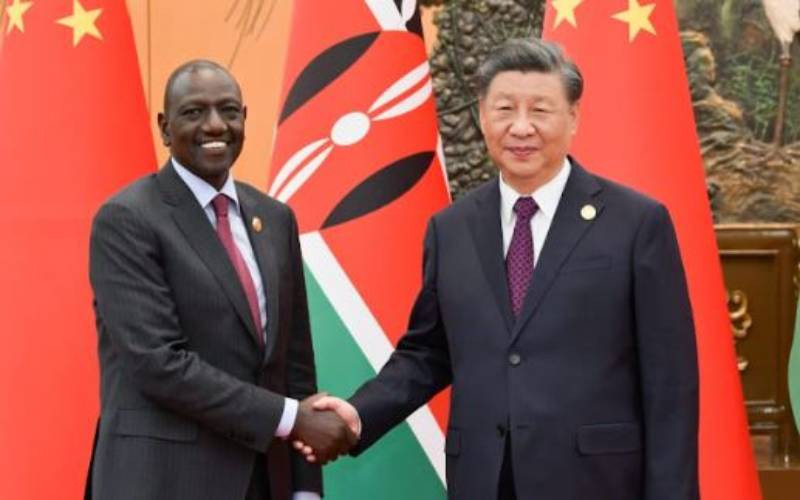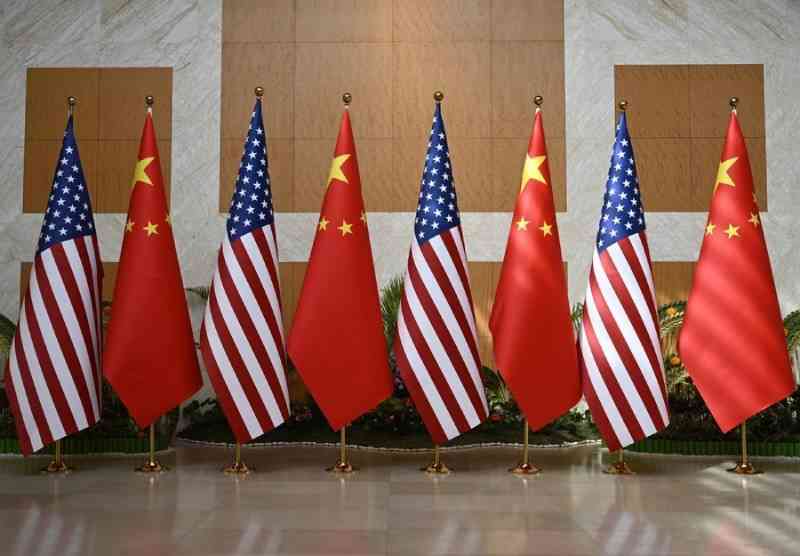 |
|
President Uhuru Kenyatta (right) inspects some of the projects during his visit to China |
BY JAMES ANYANZWA
It is rare for any government to roll out a red carpet, a military guard of honour and a 21-gun salute for a president facing trial at the International Criminal Court (ICC) for crimes against humanity.
This can only happen in a situation where a rogue state sidelined by the international community like North Korea receives a head of state from another nonconforming state like Myanmar.
Yet last month, the world, and particularly the West, was forced to watch in amazement as China entertained President Uhuru Kenyatta to a state visit. The Asian tiger rolled out all the pleasantly that comes with such accession, including a photo session with China’s President Xi Jinping outside the Great Hall of the People in Beijing.
For Kenya, this served as a clear message to the West that trying to sideline East Africa’s largest economy does not add too much because China is a willing alternative that Kenya can do business with.
But even as Kenya considers itself a darling of China, one thing, which has been overlooked, is China has its own desires and is also darling to several other Africa countries, hence it may not meet all the goodies sought by the new kid on the block.
China is looking for more partners in Africa as the country seeks to diversify its investments across the continent, with Kenya being just one of them.
Even though China has grasped the rare chance to drive its economic agenda, the outlook of its bilateral relations with Kenya appear to be shrouded by dark clouds.
Kenya has managed to secure only two commercial loans over the past five years, but indicators appear to be pointing towards an increased uptake of commercial loans, given the fading relations with the West and the erratic nature of the relationship with the Chinese.
But even as ‘pesa pap’ loans continue to influence Kenya’s s foreign policy stance, economists warn that the country’s ballooning debt from the East is but a time bomb.
The International Monetary Fund (IMF) has already raised a red flag over the shrinking grant element in Kenya’s new public sector borrowing projecting an increased reliance on commercial loans going forward, as it meets its ambitious programmes.
“The grant element on new borrowing is projected to decline gradually as the country develops and relies more on commercial loan,” the IMF said after carrying out the country’s fifth review under the extended credit facility and request for waiver and modification of performance criteria.
Syndicated loan
Last year the government concluded $600 million (Sh52.2 billion) syndicated loan from a consortium of three international banks (Citibank, Standard Chartered Bank (UK) and Standard Bank of South) to finance part of the revenue shortfalls in the 2011/2012) budget.
The other loan of 65 million Euros (Sh7.5 billion) was procured from the Standard Chartered Bank for purchase of Biometric Voter Registration (BVR) kits.
Stay informed. Subscribe to our newsletter
“We only take commercial loans in extremely exceptional circumstances,” a senior official from the Treasury who declined to be named told The Weekend Business.
But as things look, cash-hungry Kenya is slowly sinking under debt with both domestic debt and external debts rising from Sh315.5 billion and Sh434.4 billion to Sh1.06 trillion and Sh852.6 billion respectively over the last eight years.
At the end of fiscal year 2013, Kenya’s 40 million population debt burden per person stood at Sh50,000, which means the amount is the share of liability for every Kenyan.
Although the Government maintains that the debt level is sustainable, close market observers are, however, alarmed by the high rate at which the accumulated debt level is growing in recent times.
Kenya’s total public debt has risen from Sh750 billion in June 2005 to Sh2 trillion by June 30 2013.
Skeptics now warn that the country must step up economic reforms rather than increase borrowing if it wants to avert a full-blown financial crisis.
During President Uhuru ‘s visit to China, he concluded eight deals worth US$5 billion (Sh435 billion) with the Chinese government. For China, the message was clear; the country is less concerned with Kenya’s political situation but rather with opportunities that can drive its own economy by investing billions lying idle in its coffers.
The impact of the symbiotic relationship between Kenya and China, which is largely tilted in favour of the latter, are now becoming glaring in the form of the former’s ballooning public debt.
While in the 1980s and 90s foreign debt in terms of bilateral lenders was mainly from capitals like London, Washington DC, Tokyo, Berlin, Paris among others, today Beijing is the dominant force.
Tragically, data from the National Treasury show that the cost of servicing these debts is now worrying after the amount of money government spends yearly on repaying loans increased from Sh49.5 billion in June 2004 to Sh137.6 billion in June 2013.
This is mainly as a result of an increase in the level of debt stock as well as repayment of previous rescheduled loans.
An official from the Treasury who sought anonymity confirmed that the government is changing its borrowing tactics in favour of easier loans from the East with fewer or no strings attached.
“We are diversifying our sources of loans towards the East whose loans are easier to access,” said the source who added that, “the government has to source for alternative funding from various creditors to be able to finance the flagship projects under the Vision 2030 development blue-print.”
“Chinese money is tight, meaning that when they give you the money, the contractor is theirs. China also does not ask a lot of issues about the politics of the country,” explained the source.
“The West is not accommodative. For somebody who wants to move in a hurry, the West is not the best option for quick funding.”
Afraid to open up its books to audit and be questioned about its governance structures, Kenya is fleeing western powers as a source for its development funding.
“I think there is an attempt to diversify our sources of funding, which is very essential. We need other donors who have different policies,” says Prof Gerrishon Ikiara, an Associate Director at the Institute of Diplomacy and International Studies at the University of Nairobi.
“Eastern countries are much more open to new projects and their conditions are much more friendly. They don’t mix politics with development programmes. China has been giving us quite a number of commercial loans which are quite friendly,” he reckons.
Today, any mention of any major infrastructure project from the Thika Superhighway, Eastern and Southern Bypasses road, Jomo Kenyatta International Airport (JKIA) expansion among many others has a Chinese tail growing out of it.
Chinese loans are also earmarked for development of the Standard Gauge Railway (SGR), Lamu Port Southern Sudan-Ethiopia Transport Corridor (LAPSSET) and the Greenfield Terminal project at JKIA.
It is argued that though loans from the East come with fewer or no strings attached, they are no doubt expensive and a threat to the government’s policy of employment creation.
It is feared that Job opportunities for local contractors appear to be waning as Chinese import contractors for the projects they finance.
“First of all we have not been told about the interest rates on these loans but I know we are going to pay dearly for them. These loans are also killing our local contractors because our contractors cannot be able to get jobs,” says Martin Napisa, the national coordinator of the National Taxpayers Association (NTA).
“Our foreign debt is too large to the extent that it is scaring away investors and making the economy unstable. This is very dangerous for the country.”
According to Napisa, county governments will also start borrowing from the East with their debts being guaranteed by the National Government.
“If counties start borrowing, this trend will make it even worse for the national government,” he says.
“The East is trying to impress Africa. They overlook issues such as ICC because their key concern is doing business. But at the end of the day what we are getting from the East is not equivalent to the value we are supposed to get from these kind of partnerships for instance flooding our market with cheap goods from China,” says Napisa.
“We need to invest in technology and education to be able to benefit from these partnerships.”
[email protected]
 The Standard Group Plc is a
multi-media organization with investments in media platforms spanning newspaper
print operations, television, radio broadcasting, digital and online services. The
Standard Group is recognized as a leading multi-media house in Kenya with a key
influence in matters of national and international interest.
The Standard Group Plc is a
multi-media organization with investments in media platforms spanning newspaper
print operations, television, radio broadcasting, digital and online services. The
Standard Group is recognized as a leading multi-media house in Kenya with a key
influence in matters of national and international interest.
 The Standard Group Plc is a
multi-media organization with investments in media platforms spanning newspaper
print operations, television, radio broadcasting, digital and online services. The
Standard Group is recognized as a leading multi-media house in Kenya with a key
influence in matters of national and international interest.
The Standard Group Plc is a
multi-media organization with investments in media platforms spanning newspaper
print operations, television, radio broadcasting, digital and online services. The
Standard Group is recognized as a leading multi-media house in Kenya with a key
influence in matters of national and international interest.










